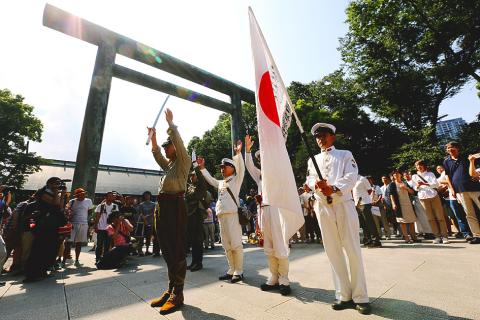Japan yesterday marked the 70th anniversary of the end of World War II under criticism from China and South Korea, which said Japanese Prime Minister Shinzo Abe’s war anniversary speech failed to properly apologize for Tokyo’s past aggression.
In a move likely to further strain relations, a trio of Cabinet ministers visited the controversial Yasukuni Shrine, which neighboring countries see as a symbol of Tokyo’s militarist past.
Memorial services on the day Japan surrendered to the Allies in 1945 come after Abe on Friday delivered a closely watched speech that expressed regret, but also said future generations need not apologize for Japan’s war record.

Photo: Bloomberg
His remarks were welcomed by the US, but blasted by China as a non-apology, while Pyongyang derided it as “an unpardonable mockery of the Korean people.”
South Korean President Park Geun-hye said his speech “left much to be desired” and stressed the need for Japan to resolve the issue of Asian women forced to work as sex slaves in Japanese military brothels.
However, the Philippines, another wartime foe, said it had rebuilt a “strong friendship” with Tokyo.
Likewise, Australian Prime Minister Tony Abbott said Abe’s remarks “should make it easier for other countries to accept Japan’s commitment to a better future for all, and to strengthen their own friendships with Japan.”
Earlier, Japanese Minister in charge of Women’s Empowerment Haruko Arimura entered the gates of Yasukuni, which is dedicated to millions of Japanese who died in conflicts — but also includes 30,304 Taiwanese who died in World War II and a museum that paints Japan as a victim of US aggression.
It makes scant reference to the brutality of invading Imperial Japanese troops when they stormed through Asia — especially China and Korea — in the 20th century.
About 60 politicians, including Japanese Minister of Internal Affairs and Communications Sanae Takaichi and Japanese Minister of State for Disaster Management Eriko Yamatani, walked down the shrine’s stone path yesterday, along with thousands of other visitors.
“How we console the souls [of war victims] is a matter for individual countries — it should not be a diplomatic issue,” Takaichi told reporters, responding to questions about possible negative reactions from Beijing and Seoul.
The visits every Aug. 15 enrage neighboring nations, which view them as an insult and painful reminder of now-pacifist Japan’s history, including its brutal occupation of the Korean Peninsula.
The grandson of a wartime Cabinet minister, Abe was not expected to visit the leafy shrine, sending a ritual offering instead. His late 2013 visit drew an angry response from Beijing and Seoul, as well as a rebuke from close ally Washington.
Founded in 1869, the Shinto shrine honors about 2.5 million Japanese who died in World War II and other conflicts, along with 14 indicted war criminals including general Hideki Tojo, who authorized the attack on Pearl Harbor, drawing the US into the war.
“The people who are enshrined died for the country — I’m here alive thanks to them,” said 70-year-old Hideko Horie, whose father died fighting in the Philippines when she was just an infant.

NATIONAL SECURITY THREAT: An official said that Guan Guan’s comments had gone beyond the threshold of free speech, as she advocated for the destruction of the ROC China-born media influencer Guan Guan’s (關關) residency permit has been revoked for repeatedly posting pro-China content that threatens national security, the National Immigration Agency said yesterday. Guan Guan has said many controversial things in her videos posted to Douyin (抖音), including “the red flag will soon be painted all over Taiwan” and “Taiwan is an inseparable part of China,” while expressing hope for expedited “reunification.” The agency received multiple reports alleging that Guan Guan had advocated for armed reunification last year. After investigating, the agency last month issued a notice requiring her to appear and account for her actions. Guan Guan appeared as required,

A strong cold air mass is expected to arrive tonight, bringing a change in weather and a drop in temperature, the Central Weather Administration (CWA) said. The coldest time would be early on Thursday morning, with temperatures in some areas dipping as low as 8°C, it said. Daytime highs yesterday were 22°C to 24°C in northern and eastern Taiwan, and about 25°C to 28°C in the central and southern regions, it said. However, nighttime lows would dip to about 15°C to 16°C in central and northern Taiwan as well as the northeast, and 17°C to 19°C elsewhere, it said. Tropical Storm Nokaen, currently

‘NATO-PLUS’: ‘Our strategic partners in the Indo-Pacific are facing increasing aggression by the Chinese Communist Party,’ US Representative Rob Wittman said The US House of Representatives on Monday released its version of the Consolidated Appropriations Act, which includes US$1.15 billion to support security cooperation with Taiwan. The omnibus act, covering US$1.2 trillion of spending, allocates US$1 billion for the Taiwan Security Cooperation Initiative, as well as US$150 million for the replacement of defense articles and reimbursement of defense services provided to Taiwan. The fund allocations were based on the US National Defense Authorization Act for fiscal 2026 that was passed by the US Congress last month and authorized up to US$1 billion to the US Defense Security Cooperation Agency in support of the

PAPERS, PLEASE: The gang exploited the high value of the passports, selling them at inflated prices to Chinese buyers, who would treat them as ‘invisibility cloaks’ The Yilan District Court has handed four members of a syndicate prison terms ranging from one year and two months to two years and two months for their involvement in a scheme to purchase Taiwanese passports and resell them abroad at a massive markup. A Chinese human smuggling syndicate purchased Taiwanese passports through local criminal networks, exploiting the passports’ visa-free travel privileges to turn a profit of more than 20 times the original price, the court said. Such criminal organizations enable people to impersonate Taiwanese when entering and exiting Taiwan and other countries, undermining social order and the credibility of the nation’s